2023届中考英语核心语法专题:现在完成时 精讲精练(通用版·含答案)
文档属性
| 名称 | 2023届中考英语核心语法专题:现在完成时 精讲精练(通用版·含答案) |
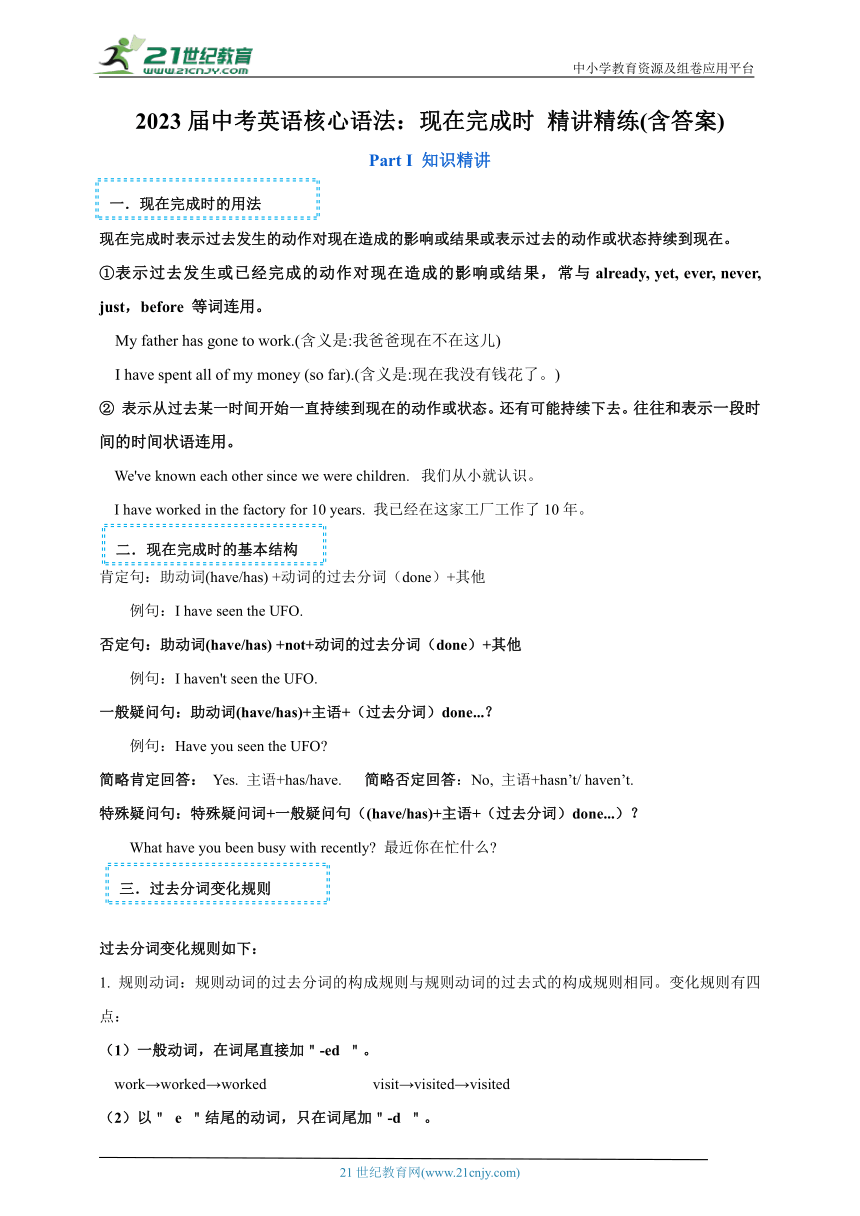
|
|
| 格式 | zip | ||
| 文件大小 | 1009.2KB | ||
| 资源类型 | 试卷 | ||
| 版本资源 | 通用版 | ||
| 科目 | 英语 | ||
| 更新时间 | 2023-02-11 00:00:00 | ||
图片预览

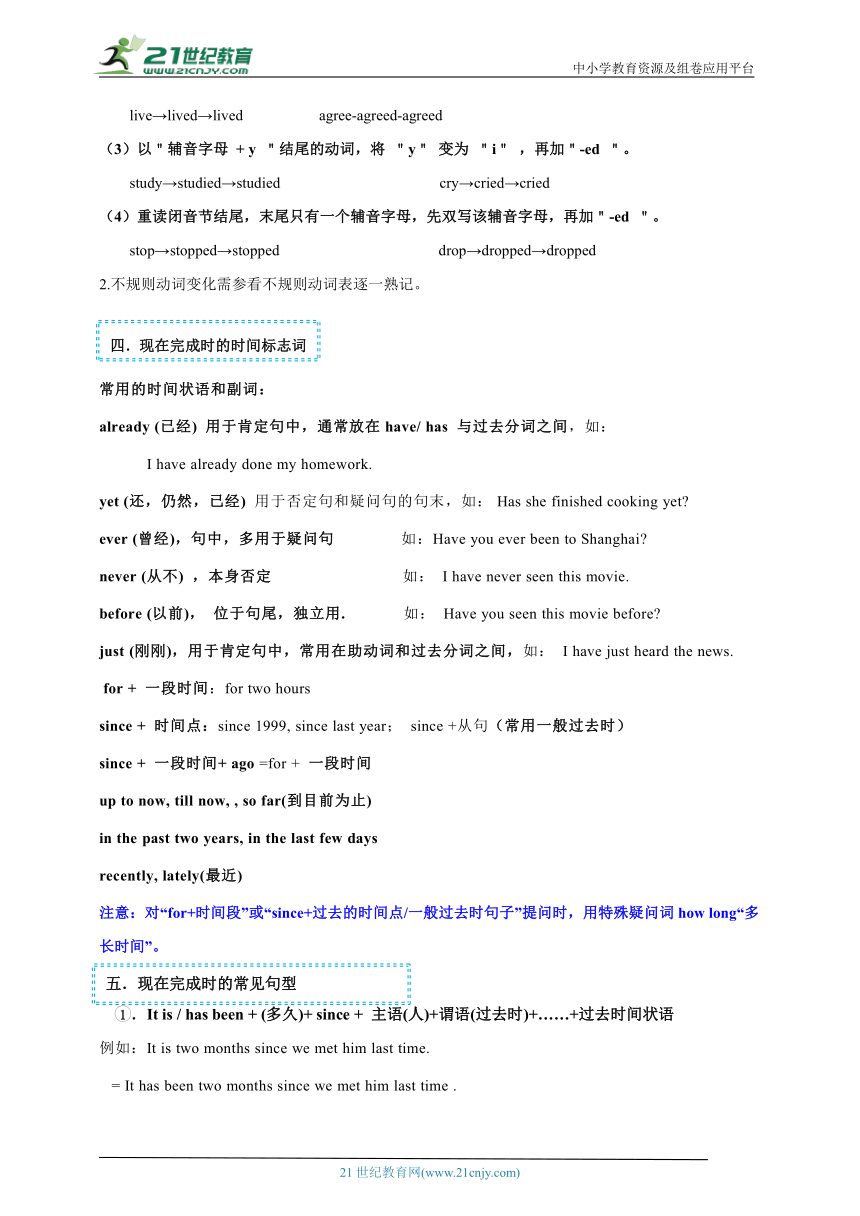
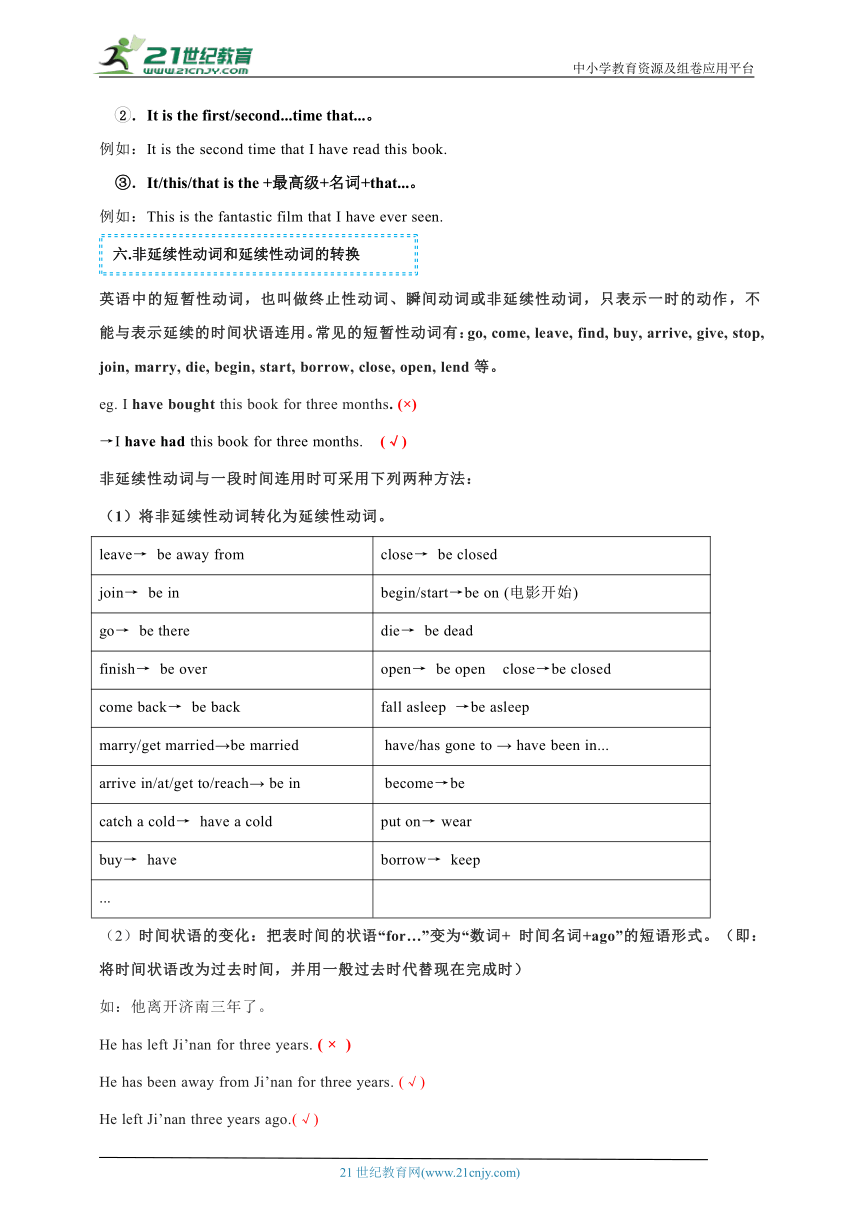
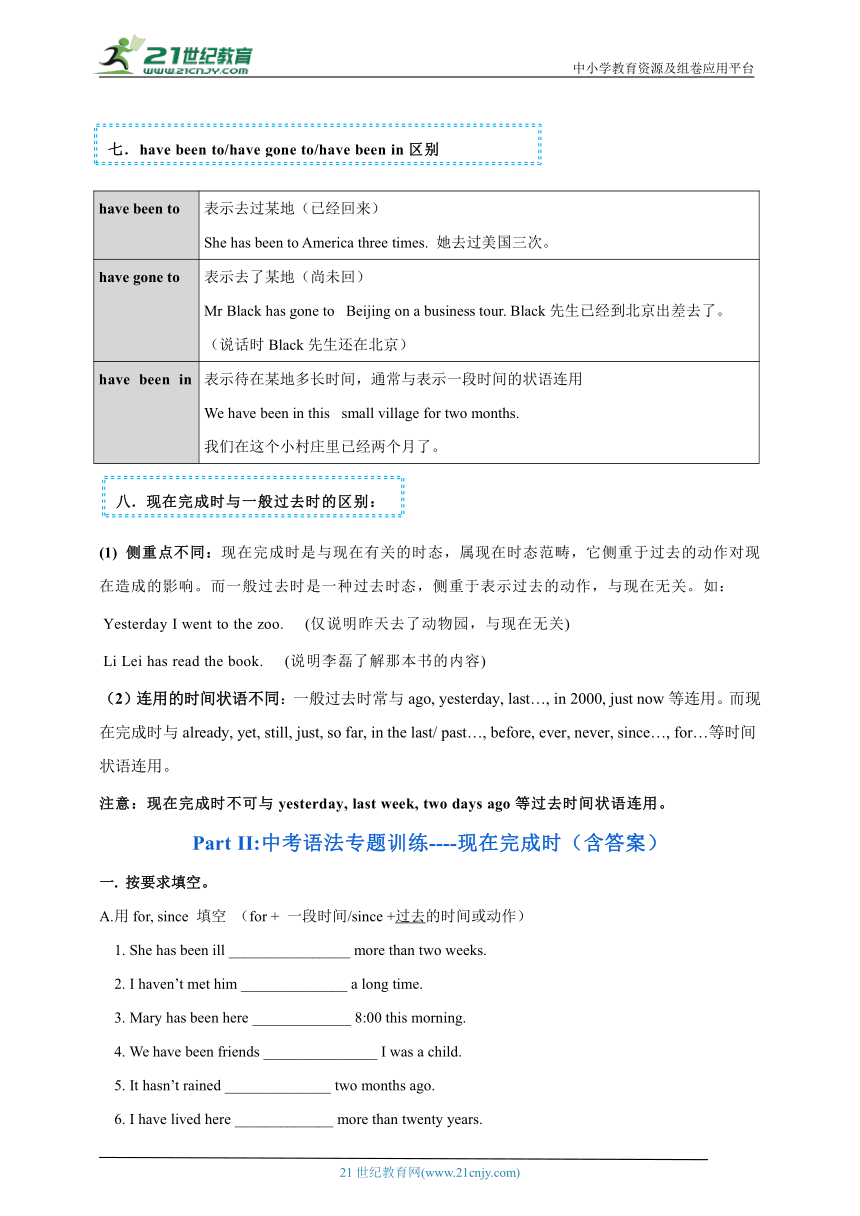
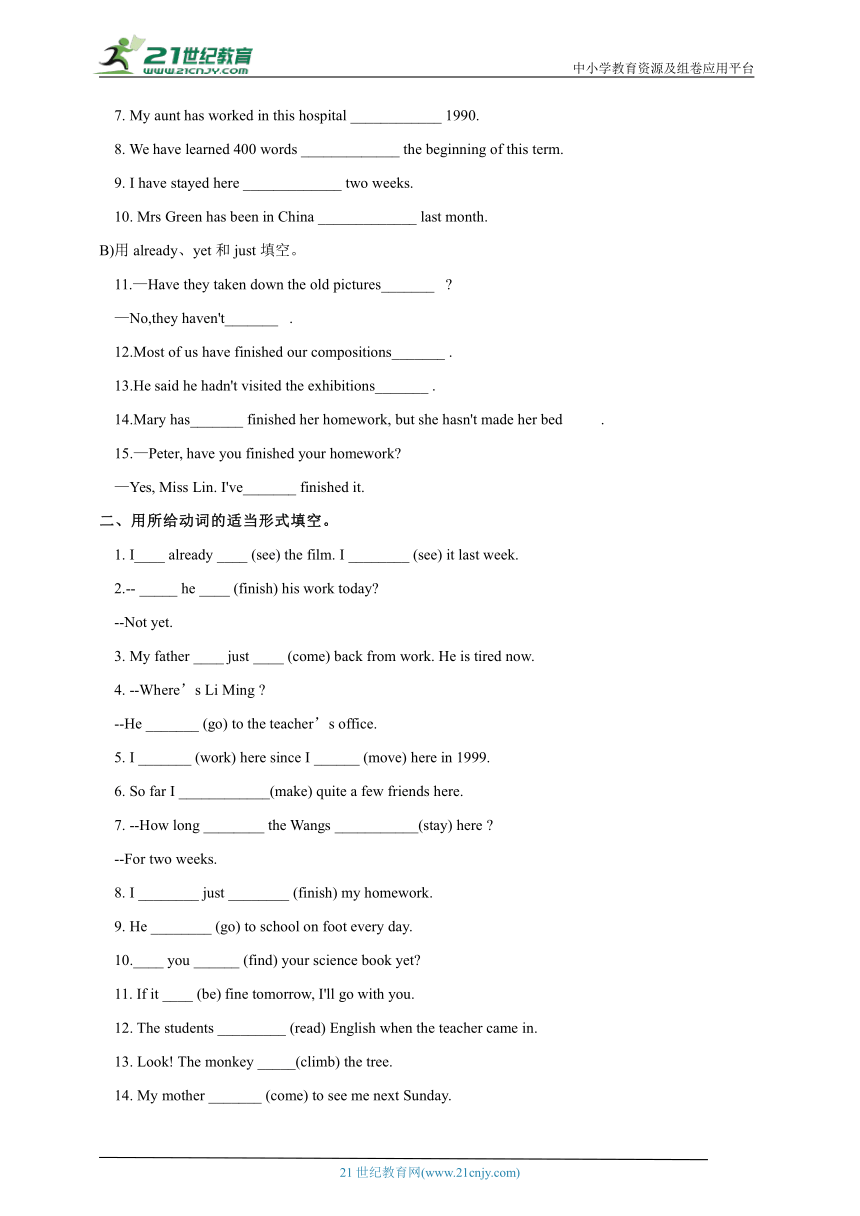
文档简介
中小学教育资源及组卷应用平台
2023届中考英语核心语法:现在完成时 精讲精练(含答案)
Part I 知识精讲
现在完成时表示过去发生的动作对现在造成的影响或结果或表示过去的动作或状态持续到现在。
①表示过去发生或已经完成的动作对现在造成的影响或结果,常与already, yet, ever, never, just,before 等词连用。
My father has gone to work.(含义是:我爸爸现在不在这儿)
I have spent all of my money (so far).(含义是:现在我没有钱花了。)
② 表示从过去某一时间开始一直持续到现在的动作或状态。还有可能持续下去。往往和表示一段时间的时间状语连用。
We've known each other since we were children. 我们从小就认识。
I have worked in the factory for 10 years. 我已经在这家工厂工作了10年。
肯定句:助动词(have/has) +动词的过去分词(done)+其他
例句:I have seen the UFO.
否定句:助动词(have/has) +not+动词的过去分词(done)+其他
例句:I haven't seen the UFO.
一般疑问句:助动词(have/has)+主语+(过去分词)done...?
例句:Have you seen the UFO
简略肯定回答: Yes. 主语+has/have. 简略否定回答:No, 主语+hasn’t/ haven’t.
特殊疑问句:特殊疑问词+一般疑问句((have/has)+主语+(过去分词)done...)?
What have you been busy with recently 最近你在忙什么
过去分词变化规则如下:
1. 规则动词:规则动词的过去分词的构成规则与规则动词的过去式的构成规则相同。变化规则有四点:
(1)一般动词,在词尾直接加"-ed "。
work→worked→worked visit→visited→visited
(2)以" e "结尾的动词,只在词尾加"-d "。
live→lived→lived agree-agreed-agreed
(3)以"辅音字母 + y "结尾的动词,将 "y" 变为 "i" ,再加"-ed "。
study→studied→studied cry→cried→cried
(4)重读闭音节结尾,末尾只有一个辅音字母,先双写该辅音字母,再加"-ed "。
stop→stopped→stopped drop→dropped→dropped
2.不规则动词变化需参看不规则动词表逐一熟记。
常用的时间状语和副词:
already (已经) 用于肯定句中,通常放在have/ has 与过去分词之间,如:
I have already done my homework.
yet (还,仍然,已经) 用于否定句和疑问句的句末,如: Has she finished cooking yet
ever (曾经),句中,多用于疑问句 如:Have you ever been to Shanghai
never (从不) ,本身否定 如: I have never seen this movie.
before (以前), 位于句尾,独立用. 如: Have you seen this movie before
just (刚刚),用于肯定句中,常用在助动词和过去分词之间,如: I have just heard the news.
for + 一段时间:for two hours
since + 时间点:since 1999, since last year; since +从句(常用一般过去时)
since + 一段时间+ ago =for + 一段时间
up to now, till now, , so far(到目前为止)
in the past two years, in the last few days
recently, lately(最近)
注意:对“for+时间段”或“since+过去的时间点/一般过去时句子”提问时,用特殊疑问词how long“多长时间”。
It is / has been + (多久)+ since + 主语(人)+谓语(过去时)+……+过去时间状语
例如:It is two months since we met him last time.
= It has been two months since we met him last time .
It is the first/second...time that...。
例如:It is the second time that I have read this book.
③.It/this/that is the +最高级+名词+that...。
例如:This is the fantastic film that I have ever seen.
英语中的短暂性动词,也叫做终止性动词、瞬间动词或非延续性动词,只表示一时的动作,不能与表示延续的时间状语连用。常见的短暂性动词有:go, come, leave, find, buy, arrive, give, stop, join, marry, die, begin, start, borrow, close, open, lend等。
eg. I have bought this book for three months. (×)
→I have had this book for three months. (√)
非延续性动词与一段时间连用时可采用下列两种方法:
将非延续性动词转化为延续性动词。
leave→ be away from close→ be closed
join→ be in begin/start→be on (电影开始)
go→ be there die→ be dead
finish→ be over open→ be open close→be closed
come back→ be back fall asleep →be asleep
marry/get married→be married have/has gone to → have been in...
arrive in/at/get to/reach→ be in become→be
catch a cold→ have a cold put on→ wear
buy→ have borrow→ keep
...
(2)时间状语的变化:把表时间的状语“for…”变为“数词+ 时间名词+ago”的短语形式。(即:将时间状语改为过去时间,并用一般过去时代替现在完成时)
如:他离开济南三年了。
He has left Ji’nan for three years. ( × )
He has been away from Ji’nan for three years. (√)
He left Ji’nan three years ago.(√)
have been to 表示去过某地(已经回来) She has been to America three times. 她去过美国三次。
have gone to 表示去了某地(尚未回) Mr Black has gone to Beijing on a business tour. Black先生已经到北京出差去了。 (说话时Black先生还在北京)
have been in 表示待在某地多长时间,通常与表示一段时间的状语连用 We have been in this small village for two months. 我们在这个小村庄里已经两个月了。
(1) 侧重点不同:现在完成时是与现在有关的时态,属现在时态范畴,它侧重于过去的动作对现在造成的影响。而一般过去时是一种过去时态,侧重于表示过去的动作,与现在无关。如:
Yesterday I went to the zoo. (仅说明昨天去了动物园,与现在无关)
Li Lei has read the book. (说明李磊了解那本书的内容)
(2)连用的时间状语不同:一般过去时常与ago, yesterday, last…, in 2000, just now等连用。而现在完成时与already, yet, still, just, so far, in the last/ past…, before, ever, never, since…, for…等时间状语连用。
注意:现在完成时不可与yesterday, last week, two days ago等过去时间状语连用。
Part II:中考语法专题训练----现在完成时(含答案)
按要求填空。
A.用for, since 填空 (for + 一段时间/since +过去的时间或动作)
1. She has been ill ________________ more than two weeks.
2. I haven’t met him ______________ a long time.
3. Mary has been here _____________ 8:00 this morning.
4. We have been friends _______________ I was a child.
5. It hasn’t rained ______________ two months ago.
6. I have lived here _____________ more than twenty years.
7. My aunt has worked in this hospital ____________ 1990.
8. We have learned 400 words _____________ the beginning of this term.
9. I have stayed here _____________ two weeks.
10. Mrs Green has been in China _____________ last month.
B)用already、yet和just填空。
11.—Have they taken down the old pictures_______
—No,they haven't_______ .
12.Most of us have finished our compositions_______ .
13.He said he hadn't visited the exhibitions_______ .
14.Mary has_______ finished her homework, but she hasn't made her bed .
15.—Peter, have you finished your homework
—Yes, Miss Lin. I've_______ finished it.
二、用所给动词的适当形式填空。
1. I____ already ____ (see) the film. I ________ (see) it last week.
2.-- _____ he ____ (finish) his work today
--Not yet.
3. My father ____ just ____ (come) back from work. He is tired now.
4. --Where’s Li Ming
--He _______ (go) to the teacher’s office.
5. I _______ (work) here since I ______ (move) here in 1999.
6. So far I ____________(make) quite a few friends here.
7. --How long ________ the Wangs ___________(stay) here
--For two weeks.
8. I ________ just ________ (finish) my homework.
9. He ________ (go) to school on foot every day.
10.____ you ______ (find) your science book yet
11. If it ____ (be) fine tomorrow, I'll go with you.
12. The students _________ (read) English when the teacher came in.
13. Look! The monkey _____(climb) the tree.
14. My mother _______ (come) to see me next Sunday.
15. I've lost my pen. ______ you ________ (see) it anywhere
三.单项选择
1. Mother _______ me a new coat yesterday. I _______ it on. It fits me well.
A. had made; have tried B. made; have tried
C. has made; tried D. made; tried
2. “He ________ to draw horses already”. “When ________ he ” “Last year.”
A. learned...has B. learned...did
C. has learned...has D. has learned...did
3. Tom _____up into the tree. Look, he ____ high up there!
A. has got…is B. has climbed…was C. got…was D. climbed…is
4. ——__________ you __________ the text yet
——Yes, we __________ it two hours ago.
A. Did; copy; did B. Have; copied; have
C. Have; copied; did D. Did; copy; had
5. —Why ________ she ________ angry
—Because he ________ at her just now.
A. did; get; shouted B. has; got; shouted
C. did; get; has shouted D. has; got; has shouted
6. ________ you ________ the film before Where ________ you ________ it
A. Have; seen; did; see B. Did; see; did; watch
C. Have; seen; have; seen D. Did; see; have; seen
7. You ________ me waiting for two hours. I ________ for you since five.
A. kept; waited B. have kept; waited
C. kept; have waited D. have kept; have waited
8. Where ______ John _______ To the library. He _________ there for an hour.
A. has…been…has gone B. has…gone…has been
C. did…go…went D. did…be…went
9. —______ the baby still _____ —No, it _______ crying.
A. Has; cried; has stopped B. Is; crying; stopped
C. Did; cry; stopped D. Is; crying; has stopped
10. I _____ the way. I ______ here for quite many years.
A. knew…have lived B. knew… live C. know…have lived D. know… live
11. —________you ever ________ America
—Yes, I have.
A. Have; gone to B. Have; gone in C. Have; been to D. Have; been in
12. My brother ________ college for over three years.
A. has gone to B. has been to C. has been in D. has been at
13. He ________ the Army by the end of 1989. He ______ in the army since then.
A. joined;is B. has joined;has been
C.had joined;is D. had joined;has been
14. By the time I _____ back, they ____ up ten satellites.
A. came; have sent B. came; had sent
C. come; have sent D. had come; sent
15.—Look! That man looks like Mr. Green.
—It _________ be him, for he _________ America for a month.
can’t; has gone to B. may not; has gone to
C. mustn’t; has been in D. can’t; has been in
16. —Look! Somebody ________ the lights.
—Well, it wasn’t me. I didn’t do it.
A. turns off B. is turning off C. was turning off D. has turned off
17. Before the news ________ him, he ________ to know about it.
A. reaches; has got B. reached; had got
C. reached; got D. had reached; got
18. —Has Mr. Green travelled abroad yet
—Not only Mr. and Mrs. Green but also their daughter ________ abroad twice.
A. have gone B. have been C. has gone D. has been
19. People ____ that the soldiers _____ fighting.
A. say...had stopped B. said...has stopped
C. say...stopped D. said...had stopped
20.—Sorry, I’m late. _________ did the meeting begin
—It doesn’t matter. The meeting _________ for several minutes.
A. When; has just begun B. When; has just been on
C. How long; has just been on D. How long; has just begun
21. They _______ for five hours when they ______ in New York.
A. flew; arrived B. had flown; had arrived
C. flew; had arrived D. had flown; arrived
22. She ____ that it _____ for two days by that day.
A. says; has rained B. says; had rained
C. said; had rained D. said; rained
23. —Which hotel will you choose for this vacation in Huangshan Mountain
—Huangshan Hotel. It is a great one and we ________ there for a week last summer.
A. have stayed B. stay C. will stay D. stayed
24. He _____ angry because he ____ for a long time.
A. had got; had waited B. got; waited
C. had got; waited D. got; had waited
25. —I have seen the film “Titanic” already.
—When __________ you __________ it?
—The day before yesterday.
A. have; seen B. will; see C. did; see D. did; seen
26. Mr. Green in China since five years ago.
A. lived B. has lived C. lives D. is going to live
27. We ____________ trees last Sunday. So far we __________ over 3,000 trees there.
A. planted; planted B. planted; have planted
C. have planted; planted D. have planted; have planted
28.__________has Mr White been a member of Greener China since he_____ to China
A. How soon, comes B. How often, got C. How long, came D. How far, arrived
29.I ________ an invitation to the concert. I can’t wait to go.
A. receive B. will receive C. was receiving D. have received
30. —Would you like to watch The Great Wall 《长城》with me
—Certainly. I don’t mind ________ it again although I ______ it twice.
A.to see; saw B. seeing; have seen
C. to see; have seen D. seeing; saw
四:汉译英。
1.吉姆已做完作业,他现在有空了。
____________________________________________________________________
2. 他昨天收到一封信。
____________________________________________________________________
3. 我父亲以前到过长城。
____________________________________________________________________
4. 她还没有看过那部新电影。
___________________________________________________________________
5. 她去过上海。
__________________________________________________________________
6. 他这些天上哪儿去了?
__________________________________________________________________
在过去的十年里,这个村庄发生了巨大的变化。
______________________________________________________________________
8.我已经借了这本杂志三个月了。
______________________________________________
参考答案:
一.
A:1. for 2. for 3. since 4. since 5. since 6. for 7. since
since 9. for 10. since
B:11.yet;yet 12.already 13.yet 14.already;yet 15.just/already.
二.
1.have,see,saw 2.Has, finished 3.has, come 4.has gone 5.have, worked,moved 6. have made 7. have,stayed 8. have,finished 9.goes 10.Have,found 11.is 12.were,reading 13.is climbing 14.will come 15.Have,seen
三.1-5 BDACA 6-10 ADBDC 11-15CCDBD
16-20 DBDDB 21-25DCDDC 26-30 BBCDB
四.汉译英
1. Jim has finished doing his homework already. He is free now.
2. He received a letter yesterday.
3. My father has been to the Great Wall before.
4. She hasn’t seen the new film yet.
5. She has been to Shanghai.
6. Where has he been these days?
7. In the past ten years, great changes have taken place in this village.
8.I have had/ kept this magazine for three months.
21世纪教育网 www.21cnjy.com 精品试卷·第 2 页 (共 2 页)
21世纪教育网(www.21cnjy.com)
2023届中考英语核心语法:现在完成时 精讲精练(含答案)
Part I 知识精讲
现在完成时表示过去发生的动作对现在造成的影响或结果或表示过去的动作或状态持续到现在。
①表示过去发生或已经完成的动作对现在造成的影响或结果,常与already, yet, ever, never, just,before 等词连用。
My father has gone to work.(含义是:我爸爸现在不在这儿)
I have spent all of my money (so far).(含义是:现在我没有钱花了。)
② 表示从过去某一时间开始一直持续到现在的动作或状态。还有可能持续下去。往往和表示一段时间的时间状语连用。
We've known each other since we were children. 我们从小就认识。
I have worked in the factory for 10 years. 我已经在这家工厂工作了10年。
肯定句:助动词(have/has) +动词的过去分词(done)+其他
例句:I have seen the UFO.
否定句:助动词(have/has) +not+动词的过去分词(done)+其他
例句:I haven't seen the UFO.
一般疑问句:助动词(have/has)+主语+(过去分词)done...?
例句:Have you seen the UFO
简略肯定回答: Yes. 主语+has/have. 简略否定回答:No, 主语+hasn’t/ haven’t.
特殊疑问句:特殊疑问词+一般疑问句((have/has)+主语+(过去分词)done...)?
What have you been busy with recently 最近你在忙什么
过去分词变化规则如下:
1. 规则动词:规则动词的过去分词的构成规则与规则动词的过去式的构成规则相同。变化规则有四点:
(1)一般动词,在词尾直接加"-ed "。
work→worked→worked visit→visited→visited
(2)以" e "结尾的动词,只在词尾加"-d "。
live→lived→lived agree-agreed-agreed
(3)以"辅音字母 + y "结尾的动词,将 "y" 变为 "i" ,再加"-ed "。
study→studied→studied cry→cried→cried
(4)重读闭音节结尾,末尾只有一个辅音字母,先双写该辅音字母,再加"-ed "。
stop→stopped→stopped drop→dropped→dropped
2.不规则动词变化需参看不规则动词表逐一熟记。
常用的时间状语和副词:
already (已经) 用于肯定句中,通常放在have/ has 与过去分词之间,如:
I have already done my homework.
yet (还,仍然,已经) 用于否定句和疑问句的句末,如: Has she finished cooking yet
ever (曾经),句中,多用于疑问句 如:Have you ever been to Shanghai
never (从不) ,本身否定 如: I have never seen this movie.
before (以前), 位于句尾,独立用. 如: Have you seen this movie before
just (刚刚),用于肯定句中,常用在助动词和过去分词之间,如: I have just heard the news.
for + 一段时间:for two hours
since + 时间点:since 1999, since last year; since +从句(常用一般过去时)
since + 一段时间+ ago =for + 一段时间
up to now, till now, , so far(到目前为止)
in the past two years, in the last few days
recently, lately(最近)
注意:对“for+时间段”或“since+过去的时间点/一般过去时句子”提问时,用特殊疑问词how long“多长时间”。
It is / has been + (多久)+ since + 主语(人)+谓语(过去时)+……+过去时间状语
例如:It is two months since we met him last time.
= It has been two months since we met him last time .
It is the first/second...time that...。
例如:It is the second time that I have read this book.
③.It/this/that is the +最高级+名词+that...。
例如:This is the fantastic film that I have ever seen.
英语中的短暂性动词,也叫做终止性动词、瞬间动词或非延续性动词,只表示一时的动作,不能与表示延续的时间状语连用。常见的短暂性动词有:go, come, leave, find, buy, arrive, give, stop, join, marry, die, begin, start, borrow, close, open, lend等。
eg. I have bought this book for three months. (×)
→I have had this book for three months. (√)
非延续性动词与一段时间连用时可采用下列两种方法:
将非延续性动词转化为延续性动词。
leave→ be away from close→ be closed
join→ be in begin/start→be on (电影开始)
go→ be there die→ be dead
finish→ be over open→ be open close→be closed
come back→ be back fall asleep →be asleep
marry/get married→be married have/has gone to → have been in...
arrive in/at/get to/reach→ be in become→be
catch a cold→ have a cold put on→ wear
buy→ have borrow→ keep
...
(2)时间状语的变化:把表时间的状语“for…”变为“数词+ 时间名词+ago”的短语形式。(即:将时间状语改为过去时间,并用一般过去时代替现在完成时)
如:他离开济南三年了。
He has left Ji’nan for three years. ( × )
He has been away from Ji’nan for three years. (√)
He left Ji’nan three years ago.(√)
have been to 表示去过某地(已经回来) She has been to America three times. 她去过美国三次。
have gone to 表示去了某地(尚未回) Mr Black has gone to Beijing on a business tour. Black先生已经到北京出差去了。 (说话时Black先生还在北京)
have been in 表示待在某地多长时间,通常与表示一段时间的状语连用 We have been in this small village for two months. 我们在这个小村庄里已经两个月了。
(1) 侧重点不同:现在完成时是与现在有关的时态,属现在时态范畴,它侧重于过去的动作对现在造成的影响。而一般过去时是一种过去时态,侧重于表示过去的动作,与现在无关。如:
Yesterday I went to the zoo. (仅说明昨天去了动物园,与现在无关)
Li Lei has read the book. (说明李磊了解那本书的内容)
(2)连用的时间状语不同:一般过去时常与ago, yesterday, last…, in 2000, just now等连用。而现在完成时与already, yet, still, just, so far, in the last/ past…, before, ever, never, since…, for…等时间状语连用。
注意:现在完成时不可与yesterday, last week, two days ago等过去时间状语连用。
Part II:中考语法专题训练----现在完成时(含答案)
按要求填空。
A.用for, since 填空 (for + 一段时间/since +过去的时间或动作)
1. She has been ill ________________ more than two weeks.
2. I haven’t met him ______________ a long time.
3. Mary has been here _____________ 8:00 this morning.
4. We have been friends _______________ I was a child.
5. It hasn’t rained ______________ two months ago.
6. I have lived here _____________ more than twenty years.
7. My aunt has worked in this hospital ____________ 1990.
8. We have learned 400 words _____________ the beginning of this term.
9. I have stayed here _____________ two weeks.
10. Mrs Green has been in China _____________ last month.
B)用already、yet和just填空。
11.—Have they taken down the old pictures_______
—No,they haven't_______ .
12.Most of us have finished our compositions_______ .
13.He said he hadn't visited the exhibitions_______ .
14.Mary has_______ finished her homework, but she hasn't made her bed .
15.—Peter, have you finished your homework
—Yes, Miss Lin. I've_______ finished it.
二、用所给动词的适当形式填空。
1. I____ already ____ (see) the film. I ________ (see) it last week.
2.-- _____ he ____ (finish) his work today
--Not yet.
3. My father ____ just ____ (come) back from work. He is tired now.
4. --Where’s Li Ming
--He _______ (go) to the teacher’s office.
5. I _______ (work) here since I ______ (move) here in 1999.
6. So far I ____________(make) quite a few friends here.
7. --How long ________ the Wangs ___________(stay) here
--For two weeks.
8. I ________ just ________ (finish) my homework.
9. He ________ (go) to school on foot every day.
10.____ you ______ (find) your science book yet
11. If it ____ (be) fine tomorrow, I'll go with you.
12. The students _________ (read) English when the teacher came in.
13. Look! The monkey _____(climb) the tree.
14. My mother _______ (come) to see me next Sunday.
15. I've lost my pen. ______ you ________ (see) it anywhere
三.单项选择
1. Mother _______ me a new coat yesterday. I _______ it on. It fits me well.
A. had made; have tried B. made; have tried
C. has made; tried D. made; tried
2. “He ________ to draw horses already”. “When ________ he ” “Last year.”
A. learned...has B. learned...did
C. has learned...has D. has learned...did
3. Tom _____up into the tree. Look, he ____ high up there!
A. has got…is B. has climbed…was C. got…was D. climbed…is
4. ——__________ you __________ the text yet
——Yes, we __________ it two hours ago.
A. Did; copy; did B. Have; copied; have
C. Have; copied; did D. Did; copy; had
5. —Why ________ she ________ angry
—Because he ________ at her just now.
A. did; get; shouted B. has; got; shouted
C. did; get; has shouted D. has; got; has shouted
6. ________ you ________ the film before Where ________ you ________ it
A. Have; seen; did; see B. Did; see; did; watch
C. Have; seen; have; seen D. Did; see; have; seen
7. You ________ me waiting for two hours. I ________ for you since five.
A. kept; waited B. have kept; waited
C. kept; have waited D. have kept; have waited
8. Where ______ John _______ To the library. He _________ there for an hour.
A. has…been…has gone B. has…gone…has been
C. did…go…went D. did…be…went
9. —______ the baby still _____ —No, it _______ crying.
A. Has; cried; has stopped B. Is; crying; stopped
C. Did; cry; stopped D. Is; crying; has stopped
10. I _____ the way. I ______ here for quite many years.
A. knew…have lived B. knew… live C. know…have lived D. know… live
11. —________you ever ________ America
—Yes, I have.
A. Have; gone to B. Have; gone in C. Have; been to D. Have; been in
12. My brother ________ college for over three years.
A. has gone to B. has been to C. has been in D. has been at
13. He ________ the Army by the end of 1989. He ______ in the army since then.
A. joined;is B. has joined;has been
C.had joined;is D. had joined;has been
14. By the time I _____ back, they ____ up ten satellites.
A. came; have sent B. came; had sent
C. come; have sent D. had come; sent
15.—Look! That man looks like Mr. Green.
—It _________ be him, for he _________ America for a month.
can’t; has gone to B. may not; has gone to
C. mustn’t; has been in D. can’t; has been in
16. —Look! Somebody ________ the lights.
—Well, it wasn’t me. I didn’t do it.
A. turns off B. is turning off C. was turning off D. has turned off
17. Before the news ________ him, he ________ to know about it.
A. reaches; has got B. reached; had got
C. reached; got D. had reached; got
18. —Has Mr. Green travelled abroad yet
—Not only Mr. and Mrs. Green but also their daughter ________ abroad twice.
A. have gone B. have been C. has gone D. has been
19. People ____ that the soldiers _____ fighting.
A. say...had stopped B. said...has stopped
C. say...stopped D. said...had stopped
20.—Sorry, I’m late. _________ did the meeting begin
—It doesn’t matter. The meeting _________ for several minutes.
A. When; has just begun B. When; has just been on
C. How long; has just been on D. How long; has just begun
21. They _______ for five hours when they ______ in New York.
A. flew; arrived B. had flown; had arrived
C. flew; had arrived D. had flown; arrived
22. She ____ that it _____ for two days by that day.
A. says; has rained B. says; had rained
C. said; had rained D. said; rained
23. —Which hotel will you choose for this vacation in Huangshan Mountain
—Huangshan Hotel. It is a great one and we ________ there for a week last summer.
A. have stayed B. stay C. will stay D. stayed
24. He _____ angry because he ____ for a long time.
A. had got; had waited B. got; waited
C. had got; waited D. got; had waited
25. —I have seen the film “Titanic” already.
—When __________ you __________ it?
—The day before yesterday.
A. have; seen B. will; see C. did; see D. did; seen
26. Mr. Green in China since five years ago.
A. lived B. has lived C. lives D. is going to live
27. We ____________ trees last Sunday. So far we __________ over 3,000 trees there.
A. planted; planted B. planted; have planted
C. have planted; planted D. have planted; have planted
28.__________has Mr White been a member of Greener China since he_____ to China
A. How soon, comes B. How often, got C. How long, came D. How far, arrived
29.I ________ an invitation to the concert. I can’t wait to go.
A. receive B. will receive C. was receiving D. have received
30. —Would you like to watch The Great Wall 《长城》with me
—Certainly. I don’t mind ________ it again although I ______ it twice.
A.to see; saw B. seeing; have seen
C. to see; have seen D. seeing; saw
四:汉译英。
1.吉姆已做完作业,他现在有空了。
____________________________________________________________________
2. 他昨天收到一封信。
____________________________________________________________________
3. 我父亲以前到过长城。
____________________________________________________________________
4. 她还没有看过那部新电影。
___________________________________________________________________
5. 她去过上海。
__________________________________________________________________
6. 他这些天上哪儿去了?
__________________________________________________________________
在过去的十年里,这个村庄发生了巨大的变化。
______________________________________________________________________
8.我已经借了这本杂志三个月了。
______________________________________________
参考答案:
一.
A:1. for 2. for 3. since 4. since 5. since 6. for 7. since
since 9. for 10. since
B:11.yet;yet 12.already 13.yet 14.already;yet 15.just/already.
二.
1.have,see,saw 2.Has, finished 3.has, come 4.has gone 5.have, worked,moved 6. have made 7. have,stayed 8. have,finished 9.goes 10.Have,found 11.is 12.were,reading 13.is climbing 14.will come 15.Have,seen
三.1-5 BDACA 6-10 ADBDC 11-15CCDBD
16-20 DBDDB 21-25DCDDC 26-30 BBCDB
四.汉译英
1. Jim has finished doing his homework already. He is free now.
2. He received a letter yesterday.
3. My father has been to the Great Wall before.
4. She hasn’t seen the new film yet.
5. She has been to Shanghai.
6. Where has he been these days?
7. In the past ten years, great changes have taken place in this village.
8.I have had/ kept this magazine for three months.
21世纪教育网 www.21cnjy.com 精品试卷·第 2 页 (共 2 页)
21世纪教育网(www.21cnjy.com)
同课章节目录
- 词法
- 名词
- 动词和动词短语
- 动词语态
- 动词时态
- 助动词和情态动词
- 非谓语动词
- 冠词
- 代词
- 数词和量词
- 形容词副词及其比较等级
- 介词和介词短语
- 连词和感叹词
- 构词法
- 相似、相近词比较
- 句法
- 陈述句
- 一般疑问句和否定疑问句
- 特殊疑问句及选择疑问句
- 反意疑问句
- 存在句(There be句型)
- 宾语从句
- 定语从句
- 状语从句
- 主谓一致问题
- 简单句
- 并列句
- 复合句
- 主谓一致
- 主、表语从句
- 名词性从句
- 直接引语和间接引语
- 虚拟语气
- 感叹句
- 强调句
- 倒装句
- 祈使句
- 句子的成分
- 句子的分类
- 题型专区
- 单项选择部分
- 易错题
- 完形填空
- 阅读理解
- 词汇练习
- 听说训练
- 句型转换
- 补全对话
- 短文改错
- 翻译
- 书面表达
- 任务型阅读
- 语法填空
- 其他资料
